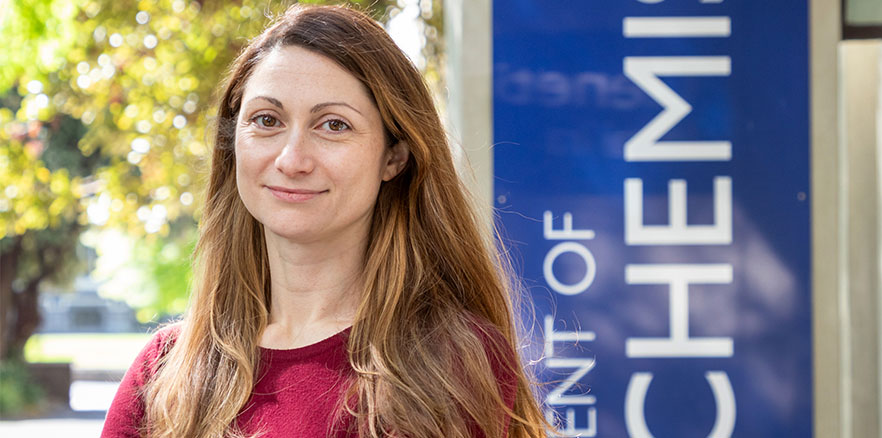
Dr Sarah Diermeier
An Otago cancer researcher's intrepid quest for new cancer therapies is professional and personal.
Dr Sarah Diermeier (Biochemistry) was 12 years old, living in Bavaria in Germany, when she determined to devote her life to cancer research after witnessing her aunt and then her grandmother suffer and die from cancer.
Diermeier says it had a huge impact on her. “I remember being really angry at the disease. Watching a relative going through cancer treatment is something that no one should have to do. Even if it is successful, the side-effects are absolutely horrible.
“RNA therapeutics is a new area of research that has this vast under-explored potential and I think there is a really good chance that we can come up with some fantastically efficacious new cancer drugs that have very low toxicity for the patient.”
“I decided that there needs to be a better way, so I went to the library and read up on what I needed to study to become a cancer researcher, all with the goal in mind of one day developing new cancer drugs that increase the survival of cancer patients but also are much better tolerated by cancer patients.”
This propelled her to complete a PhD in Biochemistry at the University of Regensburg in Bavaria in 2013 and undertake postdoctoral studies at the Cold Spring Harbor Laboratory in New York.
She just happened to start work in the New York laboratory at the same time as an Otago Biochemistry graduate, Dr Rowan Herridge, also doing postdoctoral studies. They married and relocated to Otago, both joining the Department of Biochemistry in 2018.
Diermeier was soon awarded a Rutherford Discovery Fellowship, which was the launchpad for her research at Otago on the role of what are called long non-coding ribonucleic acids (lncRNAs) in the growth and spread of cancer, picking up on research she had carried out in New York.
“RNA therapeutics is a new area of research that has this vast under-explored potential and I think there is a really good chance that we can come up with some fantastically efficacious new cancer drugs that have very low toxicity for the patient.”
Diermeier explains that she and her laboratory team are interested in specific lncRNA molecules that are present in cancer cells but not in normal healthy cells. The team's intent is to develop innovative drugs that target these molecules, stopping the growth of cancer cells and preventing their spread to other areas of the body.
The research programme is currently focused on breast and colorectal cancer, which are major health concerns in Aotearoa New Zealand and worldwide, but Diermeier says that removing these harmful lncRNAs could also hold the key to treating many additional forms of cancer, without the side-effects of treatments such as chemotherapy, thereby increasing survival rates and patient wellbeing.
Diermeier adds that the knowledge they are acquiring could also be translated to other diseases, including neurological conditions such as Alzheimer's and Parkinson's, and cardiovascular disorders.
On the back of her research programme, Diermeier has led the formation of a new biotech start-up company, Amaroq Therapeutics, to develop the cancer drugs.
The company has secured a record $14 million investment through Otago Innovation – the Otago University company that helps Otago researchers commercialise their work – on the basis of Diermeier's expertise in these IncRNAs and her ability to demonstrate their usefulness in targeting various forms of cancer. She is the company's chief scientific officer.
Diermeier says the company is aiming to develop drugs that target specific cancers. One drug for treating a particularly aggressive type of breast cancer is already undergoing pre-clinical studies with the hope of it being available to patients as a part of a clinical trial by 2024.
Diermeier's laboratory team involved in these studies includes recent PhD graduates Kathleen Lucere and Megan O'Malley, and PhD students Holly Pinkney and Kaitlyn Tippett. She is also collaborating with colleagues in the Departments of Biochemistry, Medicine and Pathology in Dunedin, and at Otago's campuses in Christchurch and Wellington, along with former colleagues at Cold Spring Harbor Laboratory.
Diermeier has led the research programme and start-up company while also starting up a family, with three-year-old Samuel welcoming his baby brother, Lukas, in July.
Recent awards
- Early Career Award for Distinctionin Research (2021)
- Otago School of Biomedical Sciences Commercialisation Researcher Award (2021)
- Rutherford Discovery Fellowship (2018)
Funding
- Brandon Capital Partners
- Cancer Society of New Zealand
- Marsden Fund Fast-Start Grant
- Maurice Wilkins Centre
- Ministry of Business, Innovation and Enterprise
- Breast Cancer Foundation NZ
- Otago Innovation
- Rutherford Discovery Fellowship
- University of Otago
More stories about early career researchers
This story is part of the research publication 'He Kitenga 2022: Talented Futures', which presents the different pathways into research that early career researchers follow.